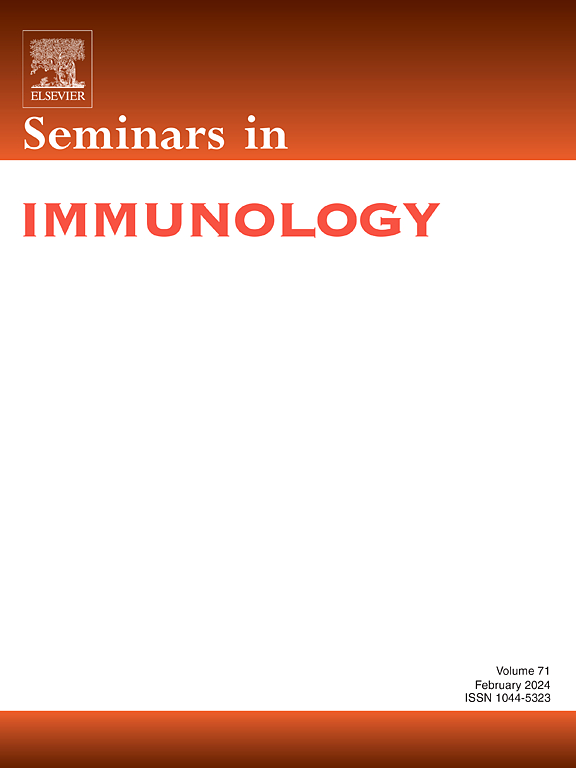内源性糖皮质激素和人体免疫:是时候重新审视旧教条了
IF 7.4
2区 医学
Q1 IMMUNOLOGY
引用次数: 0
摘要
糖皮质激素(GCs)是一种类固醇激素,在生理应激反应中具有多种重要作用。这些包括对免疫的允许和抑制作用,这有助于机体为未来的感染压力源做好准备,并控制对最近压力源的免疫反应,防止自身免疫损伤。在过去的80年里,GCs快速抑制过度活跃的免疫系统的能力已经被药理学利用,合成GCs在炎症和自身免疫性疾病的治疗中发挥了核心作用。鉴于其在临床医学中的重要性,对合成GCs的抗炎和免疫抑制作用的强调掩盖了对内源性GCs在人体免疫中的生理作用的研究。人们对神经生物学和免疫之间的交叉越来越感兴趣,以及促进对人类细胞和组织进行直接实验的技术的发展,使现在成为批判性地审查这一主题现有知识的理想时机。在本文中,我们回顾了过去100年来关于内源性糖皮质激素对人体免疫影响的生物医学文献,总结了现有的实验证据,揭示了关键的知识空白和误解,并强调了新研究的具体领域。本文章由计算机程序翻译,如有差异,请以英文原文为准。
Endogenous glucocorticoids and human immunity: Time to revisit old dogmas
Glucocorticoids (GCs) are steroid hormones with diverse and important roles in the physiologic response to stress. These include permissive and suppressive effects on immunity, which help prepare the organism for future infectious stressors and control the immunological response to a recent stressor, preventing autoimmune damage. The ability of GCs to rapidly suppress an overactive immune system has been harnessed pharmacologically and synthetic GCs have played a central role in the treatment of inflammatory and autoimmune diseases for the past eight decades. Given their importance in clinical medicine, an emphasis on the anti-inflammatory and immunosuppressive effects of synthetic GCs has overshadowed the study of the physiologic roles of endogenous GCs in human immunity. The rising interest in the intersection between neurobiology and immunity, and the development of technologies that facilitate direct experimentation with human cells and tissues, make this an ideal time to critically review existing knowledge on this subject. In this review of the past 100 years of biomedical literature on the effects of endogenous glucocorticoids on human immunity, we summarize existing experimental evidence, reveal key knowledge gaps and misconceptions, and highlight specific areas of opportunity for new research.
求助全文
通过发布文献求助,成功后即可免费获取论文全文。
去求助
来源期刊

Seminars in Immunology
医学-免疫学
CiteScore
11.40
自引率
1.30%
发文量
50
审稿时长
89 days
期刊介绍:
Seminars in Immunology is a specialized review journal that serves as a valuable resource for scientists in the field of immunology. The journal's approach is thematic, with each issue dedicated to a specific topic of significant interest to immunologists. It covers a wide range of research areas, from the molecular and cellular foundations of the immune response to the potential for its manipulation, highlighting recent advancements in these areas.
Each thematic issue is curated by a guest editor, who is recognized as an expert in the field internationally. The content of each issue typically includes six to eight authoritative invited reviews, which delve into various aspects of the chosen topic. The goal of these reviews is to provide a comprehensive, coherent, and engaging overview of the subject matter, ensuring that the information is presented in a timely manner to maintain its relevance.
The journal's commitment to quality and timeliness is further supported by its inclusion in the Scopus database, which is a leading abstract and citation database of peer-reviewed literature. Being indexed in Scopus helps to ensure that the journal's content is accessible to a broad audience of researchers and professionals in immunology and related fields.
 求助内容:
求助内容: 应助结果提醒方式:
应助结果提醒方式:


